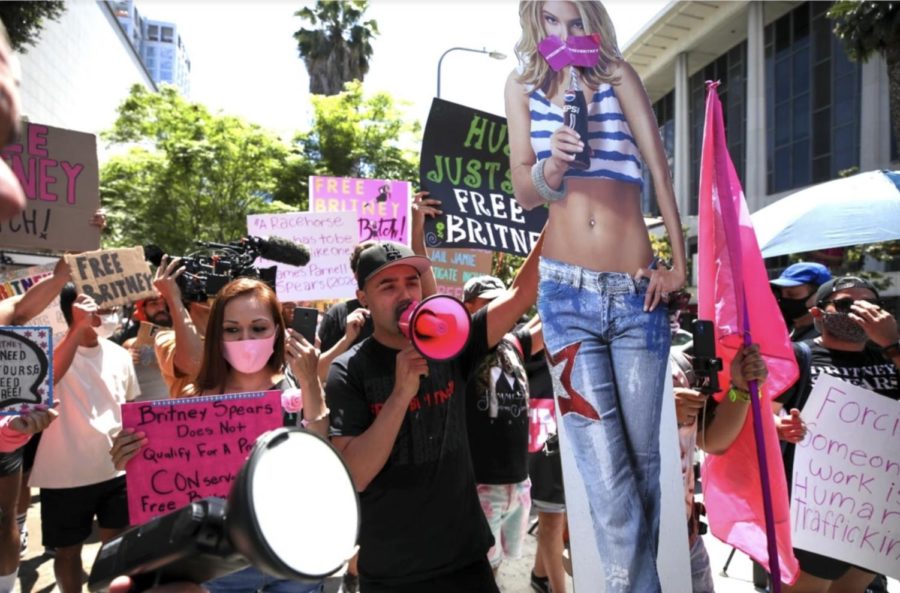How “Women are crazy” Held Britney Hostage for 13 Years
Protestors demonstrate in favor of Britney’s conservatorship termination (CREDIT: Irfan Khan/Los Angeles Times/Getty Images)
How “Women are crazy” Held Britney Hostage for 13 Years
You’ve lost control over your own finances, you’re under constant surveillance, and you don’t even have access to your car keys. For nearly 14 years this was the reality for pop star Britney Spears, whose conservatorship was recently terminated on November 12, 2021. Fans of the pop icon—particularly those part of the #FreeBritney movement, a public protest of the oppressive conditions under which Spears lived during her conservatorship—celebrated with unbridled excitement as Judge Brenda Penny ended the arrangement that held the singer for over 13 years.
Spears recognizes that, had it not been for the public pressure this movement placed on ending the arrangement managed by Jamie Spears—her father—she’d still be trapped inside it. It was, in fact, this movement of support that empowered her to make her first extensive public statements on the conservatorship in June 2021, where she passionately condemned the managers of the conservatorship who “forced her to take medication, work against her will and,” horrifyingly enough, forced her to “use a birth control device.” She also lacked autonomy over her business and finances, as those who managed her conservatorship “entered into professional contracts on behalf of [her], dictated her travel,” and kept her transactions under constant monitoring, “[logging] her every purchase down to a drink from Starbucks.”
We’d naturally conclude that this usurpation of Spears’ life would be warranted by some incapacity observed in her, considering courts institute conservatorships only if the person in question demonstrates a clear inability to take care of themself. But, with Spears, it’s a much more complicated story.
Conservatorships are typically reserved for those unable to feed, clothe, and shelter themselves. Therefore, because Spears was subject to a conservatorship, she should have demonstrated an inability to do these basic things necessary for her survival. But, she didn’t. Indeed, legal experts agree that it is extremely unusual that she was subject to one because, despite “[working] extensively as a performing musician and global celebrity,” demonstrating a mental capacity for which a conservator does not need to be appointed, the court determined she was unable to take care of herself and thus that it was necessary for a conservatorship to be enacted.
This decision was influenced by a “very public” mental health breakdown in 2007, in which Spears “shaved her own head” and “attacked the [paparazzi] surrounding her,” including smashing one of their cars with an umbrella, with brutal press coverage ensuing from it. From the information available, it seemed reasonable that she was bound to this conservatorship; she appeared mentally unwell, unstable, crazy. At least, that’s what we have been socialized into believing.
Trauma and abuse permeated Spears’ early life. Her parents shared an infinitely strained relationship, in part a result of her father’s alcoholism that “frequently led to aggression”—it was bad to such a degree that she considered their eventual divorce “‘the best thing that ever happened to [her] family.’” And this trauma was only compounded by her professional life, in which she was relentlessly sexualized by her mother, Lynne. She “insisted [Spears] should be marketed as a Lolita” regardless of whether or not that would mean she’d be “treated as a sex object by the media.” Unfortunately, this became the case. The media would relentlessly sexualize her, even when she was underage and despite her attempts at rejecting that persona.
This caused Spears to begin taking drugs at 16, at which point her mother began to “regret handing over [Spears’] career to managers” who “put her in raunchy videos and treat[ed] her like a sex object.” And, if all that wasn’t bad enough, the media continued to subject her life to intense scrutiny, publicizing her supposed struggles with drug addiction and alleging that she was cheating on Justin Timberlake—her partner at the time. Even more, their coverage of her relationship with Kevin Federline, with whom she had two kids, became excessively critical when she became mired in legal battles over the custody of her children, an intrusion into a greatly personal and private aspect of her life.
The impact this had on her caused her to act in ways that virtually necessitated the narrative that would soon circulate— the narrative calling her insane, crazy. There’s a reason Spears didn’t share her story under her conservatorship: she didn’t think anyone would believe her.
In her June public statements, she explained how “[she] didn’t want to [share her story] openly, because [she didn’t] think anyone would believe [her].” She thought people would accuse her of fabricating the story, and assumed the public would say something along the lines of: “‘she’s lying, she’s got everything; she’s Britney Spears.’”
But, why would she assume that people would, instead of sympathizing with her story of exploitation, sexualization, and abuse, simply disbelieve her and attempt to justify the conservatorship? To answer this question, there must be an analysis of why this public reaction happened in the first place.
Imagine a scenario in which a woman acts extremely irrationally, attacking others and behaving impulsively as constituting a public “meltdown.” Now, imagine that exact same scenario, except with a man. In the former situation, we would perceive some sort of legal control in which responsibility over the woman is conferred upon a trusted guardian—a conservatorship—as a proportional reaction. It’d be reasonable, a necessary step to ensure the safety of herself and other people. In the latter case, however, if we were to apply that same response, people would be overwhelmed with outrage. How dare such a restrictive response be placed on him; it’s so unfair! He was probably just extremely stressed, that’s all; there’s no need for any action to be taken. This discrepancy in the way we react to two identical scenarios, but for the gender of the person, can be explained by one simple tendency we’ve adopted as a society, namely, the fundamental attribution error.
The fundamental attribution error is the “tendency for people to explain their own behavior as a product of their situation,” but “to explain someone else’s behavior as a product of their personality.” Oftentimes it manifests when a person’s situation—because of how stressful or overwhelming it is, etc.—is the reasonable explanation for their behavior, and people nonetheless attribute it to their personality, character, or nature. And, because our society is so sympathetic to men and harsh and unforgiving towards women, we effectively analyze the actions of women (“someone else’s behavior”) through the lens of a man (“[our] own behavior”), and therefore “we are more likely to justify a man’s behavior with his situation, but more likely to explain a woman’s behavior by chalking it up to her personality.”
This perfectly explains our reactions to the two scenarios given. Men break out because of their stressful situations, and therefore

we’re more lenient towards them; women break out because they’re “crazy by nature,” and there’s no excuse for that behavior other than that fact. And this is exactly what happened when Britney Spears broke out in 2007; her extraordinarily stressful and distressing life was overlooked. She was caged, for public safety and for her own good, because she was considered naturally crazy and therefore needed to be controlled.
Britney Spears’ imprisonment in the conservatorship was a direct result of the sexist stereotype that sees women as inherently crazy, manifesting as a fundamental attribution error. Allowing this stereotype—and, by extension, this harmful tendency—to remain will continue to diminish the freedom and humanity of women.
“So long as women are called crazy, they cannot be taken seriously in any sphere of their lives,” which is exactly why Spears was trapped for so long. She, justifiably, feared that the persona forced on her by this harmful stereotype would preclude the public from believing her story. However, with her story emerging and being increasingly accepted, we’re confronted with a serious and urgent question: what do we want the future to look like for women’s freedom, and how do we achieve it? The answer is quite simple—defeat the embedded societal perception of women as crazy, so the history of Britney Spears’ suffering doesn’t become the future of women today.
Your donation will support the student journalists of Dublin High School. Your contribution will allow us to purchase equipment and cover our annual website hosting costs.

Matthew Noique is currently a sophomore at DHS. He sees writing as a form of expression and hopes to facilitate that expression as Community section...



































